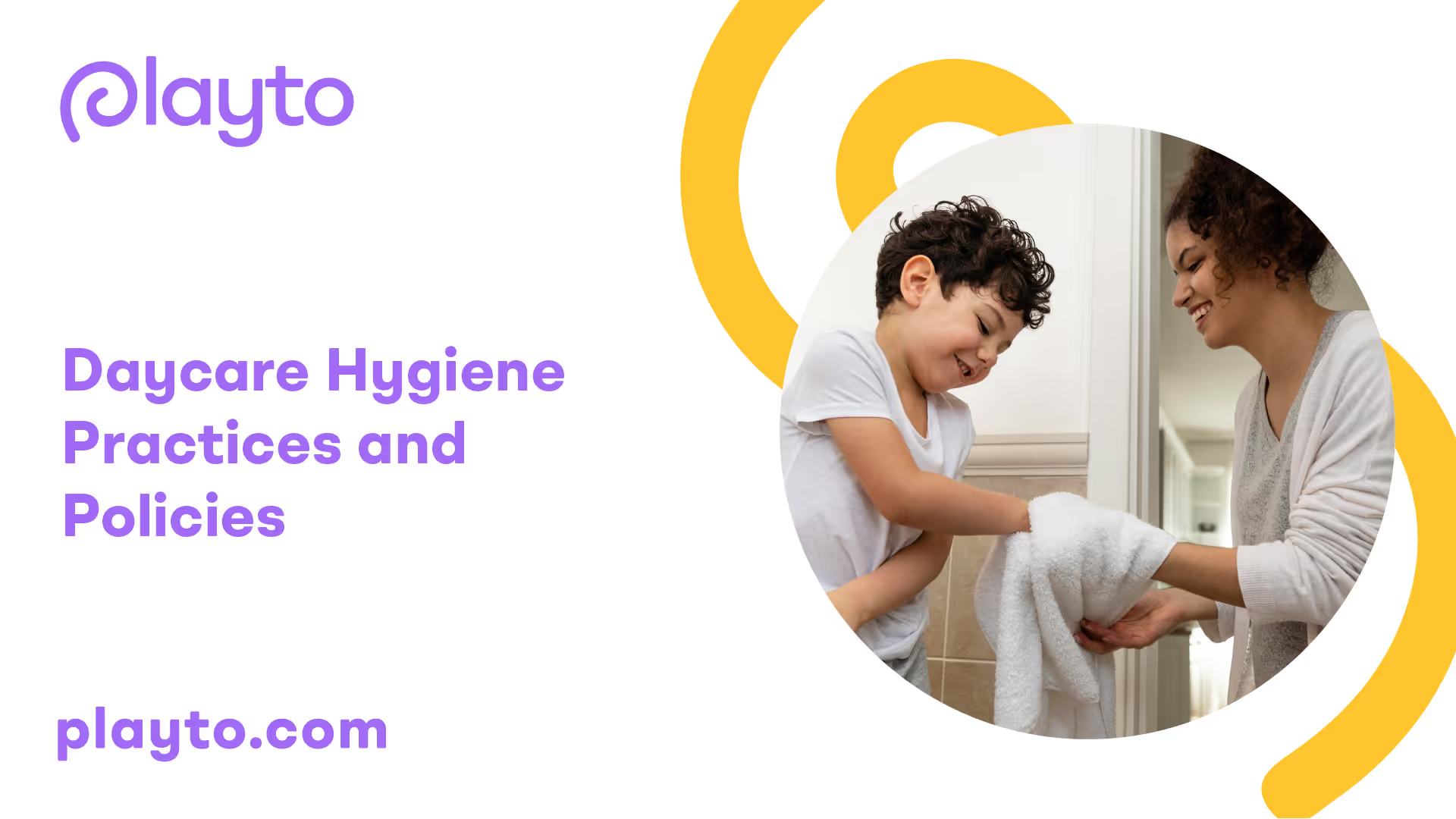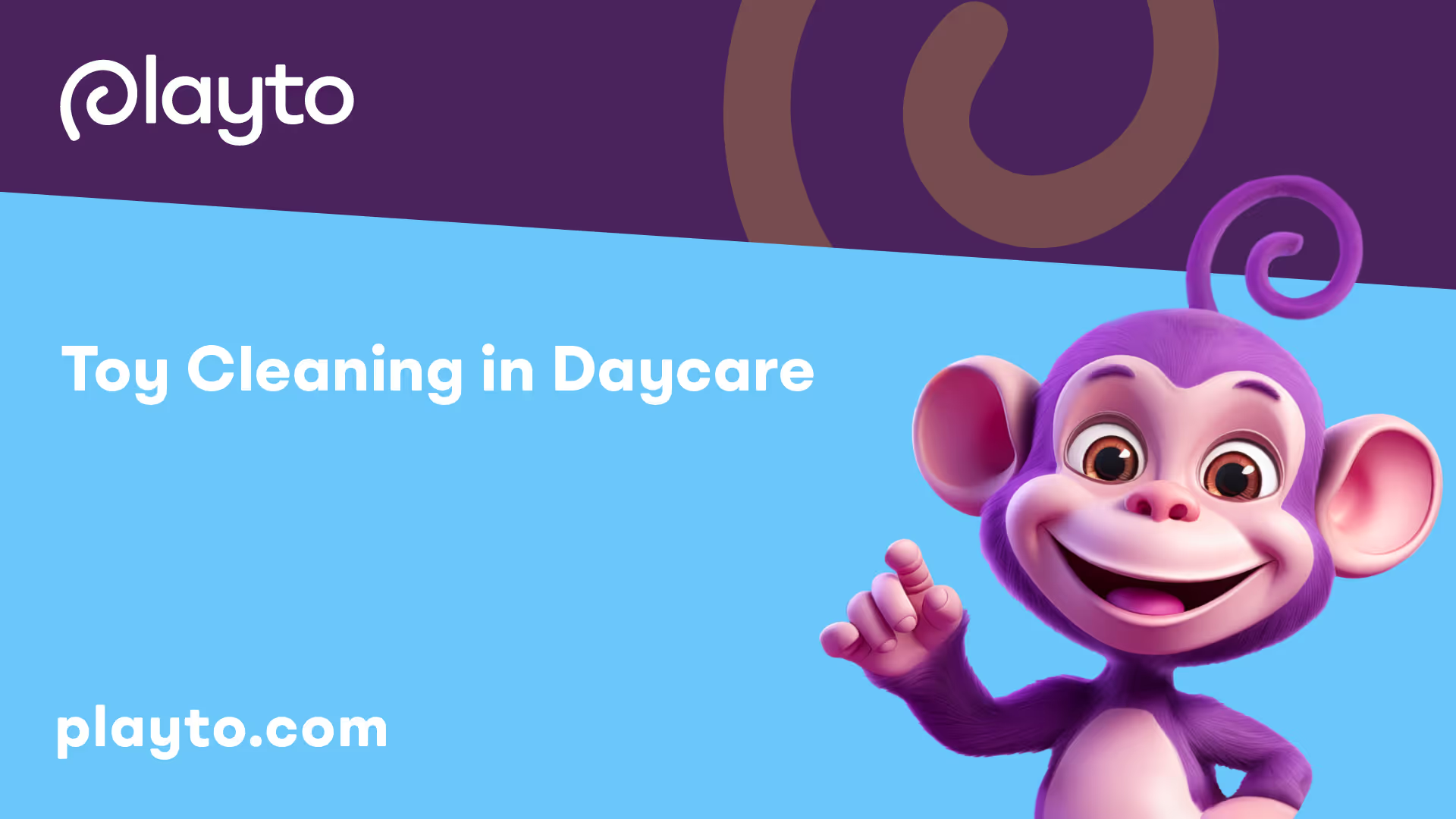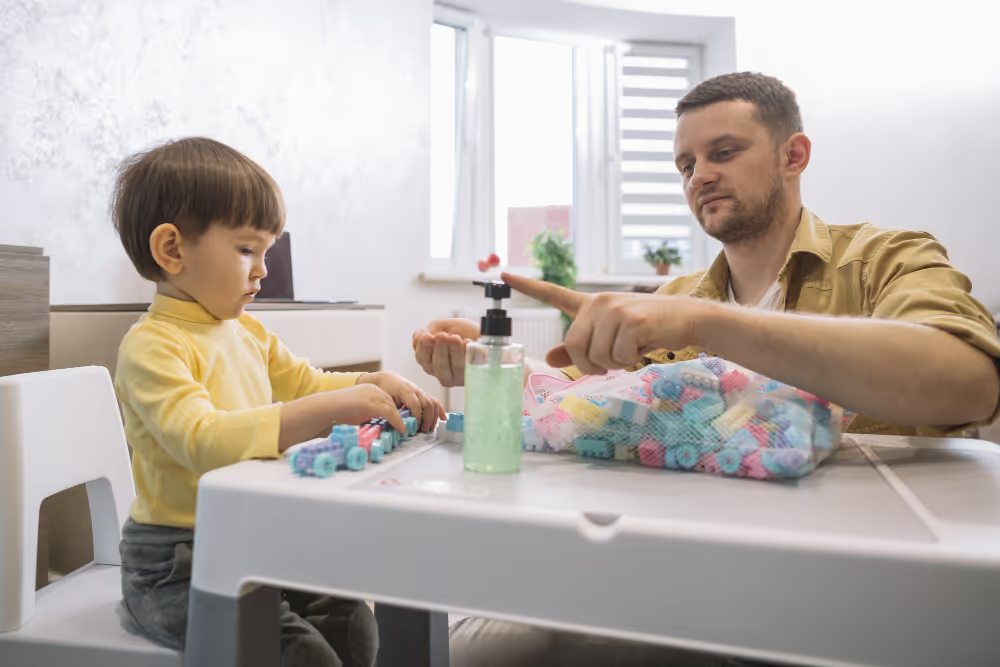Importance of Daycare Hygiene
Ensuring proper hygiene practices in daycare settings is of utmost importance to create a safe and healthy environment for children. In this section, we will provide an overview of essential hygiene practices and discuss the impact of hygiene on children.

Hygiene Practices Overview
Hygiene practices in daycare settings encompass a wide range of measures aimed at preventing the spread of germs and maintaining cleanliness. These practices include regular cleaning and disinfection of toys, handwashing protocols, facility hygiene standards, diapering and toilet training guidelines, and more.
Toys play a significant role in children's development and are often shared among daycare attendees. Therefore, it is crucial to establish thorough cleaning procedures for toys to prevent the transmission of germs. Daily cleaning procedures should be in place to address immediate contamination, such as toys that come into contact with bodily fluids like feces or vomit. Additionally, regular cleaning of toys that children put in their mouths directly, such as pacifiers, teething toys, and rattles, is recommended to ensure proper hygiene [1].
Handwashing and sanitization practices are vital in reducing the spread of germs in daycare settings. Proper handwashing protocols, including using soap and water for at least 20 seconds, should be followed by both children and caregivers. Sanitization practices, such as regularly disinfecting high-touch surfaces like doorknobs and countertops, further contribute to maintaining a hygienic environment.
Facility hygiene standards encompass cleaning regulations and disinfection protocols that daycare centers should adhere to. These standards ensure that the physical environment, including play areas, restrooms, and dining areas, is clean and free from potential health hazards.
Impact of Hygiene on Children
Maintaining good hygiene practices in daycare settings has a significant impact on children's health and well-being. While it is natural for young children to experience more illness in daycare due to exposure to various germs, proper hygiene measures help minimize the risk and spread of infections.
Teaching children good hygiene practices from an early age has long-term benefits. It not only helps in preventing the spread of diseases within daycare facilities but also encourages the formation of lifelong positive hygiene habits. Children learn the importance of handwashing, covering their mouths when coughing or sneezing, and other hygiene practices that contribute to their overall health and well-being.
Moreover, research suggests that children who attend daycare may actually have lower infection rates in kindergarten and first grade compared to those who did not attend daycare. This may be attributed to the development of stronger immune systems through exposure to germs in a controlled environment.
By prioritizing hygiene practices in daycare settings, caregivers and parents can create a safe and healthy environment that promotes the well-being and development of children. It is essential to follow proper hygiene protocols, as well as familiarize oneself with daycare policies on hygiene and related topics such as daycare illness policies and daycare policies on personal belongings and toys.
Toy Cleaning in Daycare
Ensuring proper toy cleaning practices is an essential aspect of maintaining a hygienic environment in daycare settings. Regular cleaning and disinfection of toys help prevent the spread of germs and provide a healthy space for children to learn and play. In this section, we will explore the daily cleaning procedures and weekly disinfection guidelines for toys in daycare.

Daily Cleaning Procedures
Toys that are used daily, especially those that children put in their mouths directly, should be cleaned on a daily basis to maintain proper hygiene. This includes toys such as pacifiers, teething toys, and rattles that come into direct contact with children's mouths. Daily cleaning procedures for toys in daycare may include:
- Carefully inspecting toys for any visible dirt, stains, or contamination.
- Removing any loose debris or dirt by wiping or brushing the toy.
- Cleaning the toy with a mild detergent or child-safe disinfectant solution.
- Rinsing the toy thoroughly with clean water to remove any cleaning residue.
- Allowing the toy to air dry completely before returning it to the play area.
- Storing cleaned toys separately from dirty ones to prevent cross-contamination.
By following these daily cleaning procedures, daycare providers can help reduce the risk of illness transmission and maintain a safe environment for children.
Weekly Disinfection Guidelines
In addition to daily cleaning, weekly disinfection of toys is recommended in most daycare facilities. This practice is crucial for preventing the spread of germs, bacteria, and viruses that can accumulate on toys over time. Weekly disinfection guidelines for toys in daycare may include:
- Using a child-safe disinfectant solution to sanitize the toys.
- Paying special attention to toys that have been in contact with bodily fluids, such as feces or vomit. Immediate cleaning of these toys is crucial to prevent the spread of germs.
- Ensuring that all surfaces of the toys, including hard-to-reach areas, are properly disinfected.
- Following the manufacturer's instructions for recommended disinfection contact time.
- Thoroughly rinsing the toys with clean water after disinfection.
- Allowing the toys to air dry completely before returning them to the play area.
Implementing these weekly disinfection guidelines helps maintain a safe and clean environment for children, reducing the risk of infections and promoting their overall well-being.
Regular and thorough cleaning of toys in daycare is essential to prevent the spread of germs and maintain a healthy environment for children. By following the daily cleaning procedures and weekly disinfection guidelines, daycare providers can ensure that toys are safe and hygienic for children to play with. For more information on daycare policies and practices, you can explore our article on daycare policies on personal belongings and toys.
Child Immunity in Daycare
Ensuring the health and well-being of children in daycare goes beyond implementing strict hygiene practices. Building strong immune systems and managing health risks are essential components of daycare policies.

Strengthening Immune Systems
Exposure to viruses and bacteria early in life can actually strengthen children's immune systems. When children come into contact with pathogens, their bodies develop antibodies to combat specific virus strains. This process helps build immunity and prepares their immune systems to better defend against future infections.
Parents play a crucial role in strengthening their child's immune system, regardless of whether they attend daycare or not. Encouraging healthy practices such as eating nutritious foods, getting enough sleep, engaging in outdoor play, and staying hydrated can contribute to overall immune system health. By incorporating these habits into their daily routines, parents can support their child's immune system development [3].
Balancing Health Risks
It's important for parents to understand that they cannot shield their children from every illness, whether they attend daycare or not. Illnesses are a normal part of childhood, and exposure to certain pathogens can help strengthen the immune system in the long run. Research shows that kids in daycare may have higher rates of illness compared to those at home until around age 3, after which infection rates tend to equalize. Surprisingly, infection rates in kindergarten and first grade tend to be higher in children who did not attend daycare.
Daycare facilities can help balance health risks by implementing comprehensive hygiene practices and policies. Teaching children good hygiene practices, such as proper handwashing techniques, can significantly reduce the spread of diseases. Handwashing is one of the most critical hygiene habits children need to learn, as it helps reduce the risk of falling ill. Additionally, teaching other self-help and self-care skills, such as showering and brushing teeth, can further limit cross-infection within the daycare environment [2].
By striking a balance between supporting children's immune system development and maintaining hygienic practices, daycare centers can provide a safe and healthy environment for children to learn and grow. It is important for parents to understand that occasional illnesses are a natural part of childhood and can contribute positively to the maturation of their child's immune system. For more information on daycare policies, including illness guidelines, check out our article on daycare illness policies: when to keep your child home.
Handwashing and Sanitation
Maintaining proper handwashing and sanitation practices is of utmost importance in daycare settings. These practices play a vital role in preventing the spread of germs and illnesses among children and caregivers. In this section, we will explore the handwashing protocols and sanitization practices that should be implemented in daycare facilities.
Handwashing Protocols
Handwashing is one of the most critical hygiene habits that children need to learn, as it reduces the risk of them falling ill. To ensure effective handwashing, the following protocols should be followed:
- Children and caregivers should wash their hands frequently throughout the day, including before and after handling food, after using the toilet, after helping a child wipe their nose, before and after playing in water used by other children, and after handling pets or animals.
- Use warm running water and liquid soap to lather the hands.
- Rub the hands vigorously for at least 20 seconds, making sure to clean all surfaces, including the palms, back of hands, between fingers, and under nails.
- Rinse hands thoroughly under running water.
- Dry hands using disposable paper towels or air dryers.
- Encourage children to sing a song or use a timer to ensure they wash their hands for the recommended duration.
By following these handwashing protocols, daycare centers can create a hygienic environment that reduces the risk of infections and promotes the well-being of children and caregivers.
Sanitization Practices
In addition to handwashing, proper sanitization practices are crucial in daycare centers to maintain a clean and healthy environment. These practices help minimize cross-infection and ensure the safety of children and caregivers. Some key aspects of sanitization in daycare settings include:
- Regular cleaning of frequently touched surfaces, such as doorknobs, light switches, tables, chairs, and toys, using appropriate disinfectants.
- Providing sanitizing solutions or wipes in common areas for quick and easy access.
- Encouraging children to sanitize their hands before and after using shared equipment or toys.
- Regularly laundering and sanitizing soft toys, blankets, and other items that come into direct contact with children.
- Adhering to written hygiene policies and procedures that align with government recommendations [2].
- Ensuring that caregivers receive training on proper sanitization techniques and follow them consistently.
By implementing these sanitization practices, daycare centers can create a clean and safe environment that supports the health and well-being of children, families, and staff.
Proper handwashing and sanitation practices are essential components of daycare hygiene policies. They help reduce the risk of infections, promote healthy habits, and create a safe environment for children to learn and play. By following these protocols and regularly reviewing and updating them, daycare centers can ensure the well-being of everyone involved in their care.
Facility Hygiene Standards
Maintaining high standards of hygiene is essential in daycare facilities to provide a safe and healthy environment for children. Daycare centers should adhere to specific cleaning regulations and follow disinfection protocols to minimize the risk of spreading germs and safeguard the well-being of children.
Cleaning Regulations
To ensure a clean and sanitary environment, daycare centers should implement structured cleaning regulations. Countertops, tables, and other surfaces should be cleaned thoroughly after each use, and both cleaned and sanitized at the end of each day. High-contact areas, such as door handles, faucets, light switches, and telephones, should be given extra attention to prevent the transmission of germs.
Toys, especially those put in children's mouths, should be cleaned and sanitized regularly. According to JBN Cleaning, toys in childcare should be cleaned frequently on a weekly basis, and if they are used daily, they should be cleaned daily. Immediate cleaning of toys contaminated with bodily fluids like feces or vomit is crucial to prevent the spread of germs.
Diaper changing areas should be disinfected after each use to maintain cleanliness and reduce the risk of cross-contamination. Proper disposal of used diapers and regular cleaning of changing tables and surfaces are essential to maintain hygiene standards.
Disinfection Protocols
In addition to regular cleaning practices, daycare centers should also follow disinfection protocols. Disinfection helps to eliminate harmful pathogens and reduce the risk of infectious diseases. Daycare centers should use solutions approved by health authorities, such as diluted bleach or alcohol solutions, for disinfecting surfaces.
Toys should be cleaned daily and disinfected weekly or more frequently if used by multiple children. EMist recommends using non-toxic, fragrance-free cleaners for daily use and following manufacturer guidelines for toy disinfection.
It's important for daycare facilities to prioritize the health and safety of children by maintaining proper facility hygiene standards. By following cleaning regulations and disinfection protocols, daycare centers can create a clean and healthy environment that promotes the well-being of all children in their care.
For more information on daycare policies and practices, you may be interested in reading our articles on daycare illness policies: when to keep your child home, daycare policies on screen time, daycare policies on personal belongings and toys, and daycare policies on medication administration.
Diapering and Toilet Training
Proper diapering and toilet training practices are essential components of daycare hygiene policies. Maintaining a clean and safe environment for children during diaper changes and toilet training helps prevent the spread of germs and promotes good hygiene habits. In this section, we will discuss the diapering area requirements and toilet training guidelines that daycare facilities should follow.
Diapering Area Requirements
According to the Virginia Administrative Code, diapering areas in child day centers must meet specific requirements to ensure hygiene and safety. These requirements include:
- A sink with running warm water, soap, disposable towels, and single-use gloves should be readily available in the diapering area.
- The diapering surface should be nonabsorbent and easily cleanable.
- Soiled clothing must be promptly cleaned and changed to maintain cleanliness.
- Disposable diapers should be disposed of in a leakproof system without touching exterior surfaces.
To maintain a hygienic environment, daycare staff should clean the diapering surface with soap and sanitize it after each use. It is important to note that tables used for children's activities or meals should not be used for changing diapers to prevent cross-contamination.
Toilet Training Guidelines
Daycare facilities play an important role in assisting children with toilet training. According to the Virginia Administrative Code, there should be at least one toilet chair or child-sized toilet available for every 10 children in the process of toilet training. These items should be promptly emptied, cleaned, and sanitized after each use.
To ensure the safety and supervision of children, toilet chairs or child-sized toilets should be located in a way that allows for sight and sound supervision by staff in the classroom. This helps maintain the required staff-to-children ratios while promoting a safe and supportive environment during toilet training.
By following these guidelines, daycare facilities create a clean and healthy environment for diapering and toilet training. These practices not only promote good hygiene but also help children develop essential self-care skills. For more information on daycare policies and practices, check out our articles on daycare illness policies: when to keep your child home, daycare policies on screen time, daycare policies on personal belongings and toys, and daycare policies on medication administration.
